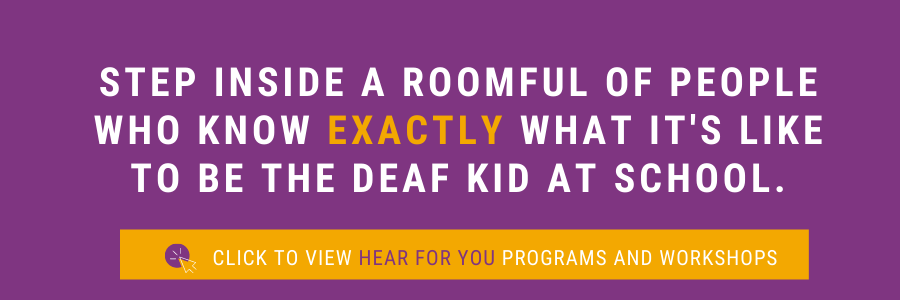Deaf teenagers may find it difficult to socialise in mainstream schools, but there are ways that this situation can be improved. During your teen years, you’re fine-tuning existing skills and developing new social skills for the very first time. If you aren’t allowed to grow, it can be difficult to socialise in the future.
We found an interesting study by Marzena Razny called, Social integration or social alienation: A look at the social functioning of oral deaf teenagers in the mainstream educational setting. We have shared interesting points on Marzena’s work below, that sparks great conversation and greater awareness.
How do deaf teenagers compare socially to their hearing peers?
Being deaf can feel alienating and make deaf teenagers less likely to take risks and engage in new activities. Consequently, deaf teens may socialise less in general and may be less likely to pick up hobbies outside of school with their hearing peers. This in turn can make it more difficult for teenagers to learn to socialise and improve their skills, as socialisation is a matter of practice. Think about the experience that can be gained when teens meet each other and bond outside of a school setting rather than during structured school activities.
Often, deaf teenagers perceive themselves as being less socially capable than their peers, even if they find themselves equal in all other respects. A feeling of limited social acceptance may be associated with the inability to connect in any extracurricular activities.
Deaf teens (and deaf children) often find it difficult to interact in larger groups, due to the communication barrier. Many feel more comfortable one-on-one, rather than in a large group.
What environmental factors impact the social skills of deaf teens?
Oral skills are one of the major factors. The more oral skills a deaf teen has, the more likely they are to understand the communication of their hearing peers, and to convey their own meaning.
Having more language to explain their own feelings also helps; studies have shown that both deaf and hearing teens are better able to regulate their emotions when they are better able to describe their emotions in words. Having to say “I’m angry” is more difficult for a teen (or any person) to deal with than “I’m disappointed” or something else with greater clarity.
In deaf teens, females were generally able to develop socially faster than male deaf teens, as they had a larger social tool set to draw from. Hobbies and activities that don’t require communication with large groups, but still lead to socialisation, may be best for a deaf teen. Consider for example, photography, filming video/editing, running or hiking.
Insights Into Deaf Teenagers in Mainstream School
Razny highlights in her study some results gathered by Punch and Hyde (2005) who measured social loneliness, as a reverse concept of social competence in 65 deaf adolescents in general education classrooms, grades 10 through 12.
All of these adolescents reported a desire to be:
- treated normally,
- not to be seen as different, and
- not to draw attention to their hearing loss.
Many deaf adolescents commented that they felt more socially isolated in the early years of school. We can ask whether it may be due to mastering more social skills, gaining confidence, or due to greater tolerance of hearing peers as they got older.
Adolescents reported areas of concern related to:
- being pulled out of class by their hearing itinerant,
- use of their FM system in the classroom,
- times when some of their friends forgot, or were unaware of the need to speak clearly and face them.
The participants reported that these difficulties caused:
- negative reactions from hearing peers,
- feelings of embarrassment due to misunderstanding, and
- self-consciousness while interacting with hearing peers,
- doubts about their social self-concept,
- a decrease in self confidence in social interactions.
Insights from other studies showed a lack of peer acceptance negatively influences academic self-concept (one’s belief about his/her academic abilities) and increases anxiety, sadness, and feelings of loneliness, indirectly affecting academic performance. [Moeller, 2007]
Interestingly, several studies report increased self-confidence, greater self-esteem and improved communication skills for students with cochlear implants. [Bat-Chava et al., 2005; Leigh et al., 2009]
Those who showed high levels of self-esteem used spoken language as a primary mode of communication. The majority of these deaf adolescents demonstrated social skills such as assertion, responsibility, or empathy at similar or better levels than those of their hearing peers. [Moog and colleagues (2011)]
Female cochlear implanted adolescents displayed significantly fewer internalising problems, such as anxiety and loneliness than their hearing female peers, while male cochlear implanted adolescents displayed significantly fewer externalising problems, such as physical aggression and arguing than their hearing male peers. [Moog and colleagues (2011)]
Razny’s conclusion states this:
Although studies show mixed results, it appears that, under the right circumstances, hearing-impaired adolescents are doing better socially than those who were mainstreamed decades ago.
They are more socially accepted, have better self-esteem, and stronger social skills than those deaf and hard of hearing peers who were mainstreamed before them.
They are more socially accepted, have better self-esteem, and stronger social skills than those deaf and hard of hearing peers who were mainstreamed before them.
Factors that contribute to a great degree to the social acceptance of deaf and hard of hearing students in the mainstream setting include:
- language and speech competence,
- development of theory of mind,
- gender,
- participation in nonacademic activities,
- attitudes of hearing students
- general education teachers toward people with disabilities,
- awareness of the special communication needs of deaf students,
- acoustic considerations,
- social skills,
- self-esteem,
- individual characteristics of the student,
- age of implantation, and
- length of cochlear implant use.
There is emphasis on the success of social acceptance being facilitated through:
- promoting positive attitudes among hearing students and fostering acceptance of students with disabilities
- actively facilitating meaningful interactions between deaf and hearing peers, through activities such as collaborative learning, and encouraging participation in nonacademic activities
- creating acoustically sound environments and allowing extended time during collaborative learning experiences as well as nonacademic activities
- increasing awareness of the specific communication needs of deaf and hard of hearing students
- increasing social skills competency through social skills training tailored specifically to the unique needs of deaf and hard of hearing adolescents, and including the language of emotions.
How Hear For You Can Help
We have a lot of hands-on experience with deaf or hard of hearing teens, so finding research reports like these referenced above are an indication of increased awareness and social acceptance of deafness within our mainstream school system. We are please to be driving conversations and moving deaf issues into the forefront of mainstream society.
In addition to the factors raised above, we find these factors play a significant role in the social skills of DOHH teens:
- Family acceptance
- Level of hearing loss
- Willingness to wear devices.
Our programs and workshops are the perfect way to equip deaf teenagers with the opportunity to meet other deaf teens, learn and grow. Sometimes in our workshops, this is the first time a teenager has met or spoken to another deaf peer. However we provide the perfect platform for teens to learn more about:
- Personal identity
- Communication & conflict resolution
- Friendships
- School subject & career choices
- Casual work and career opportunities
- Teamwork & leadership
- Technology & social media safety.
Sometimes, for participants in our workshops, this is the first time a teenager has met or spoken to another deaf peer.
If you or someone you know is interested in our programs, please reach out to us and speak to one of our mentors, or join an upcoming program in your State or Territory.




